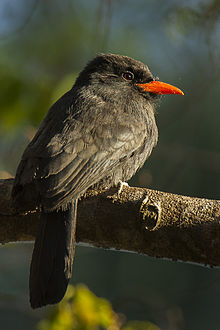| Black-fronted nunbird | |
|---|---|

| |
| Conservation status | |
 Least Concern (IUCN 3.1) | |
| Scientific classification | |
| Domain: | Eukaryota |
| Kingdom: | Animalia |
| Phylum: | Chordata |
| Class: | Aves |
| Order: | Piciformes |
| Family: | Bucconidae |
| Genus: | Monasa |
| Species: | M. nigrifrons |
| Binomial name | |
| Monasa nigrifrons (Spix, 1824) | |

| |
The black-fronted nunbird (Monasa nigrifrons) is a species of near-passerine bird in the family Bucconidae, the puffbirds, nunlets, and nunbirds. It is found in Bolivia, Brazil, Colombia, Ecuador, and Peru.
Taxonomy and systematics
The black-fronted nunbird has two subspecies, the nominate M. n. nigrifrons and M. n. canescens. Some authors treat it, the black nunbird (M. atra) and the white-fronted nunbird (M. morphoeus) as a superspecies.
Description
The black-fronted nunbird is 26 to 29 cm (10 to 11 in) long and weighs 68 to 98 g (2.4 to 3.5 oz). The adult of the nominate subspecies is mostly sooty black that is darkest around the bill (the "front"). The rear part of the body is blue-gray and the tail blue-black. The bill is red, the eye dark, and the legs black. M. n. canescens is slightly paler and grayer than the nominate. The juvenile of both is a dirty slate gray with irregular reddish marks.
Distribution and habitat
The nominate subspecies of black-fronted nunbird is widespread in the Amazon Basin. It is found in southeastern Colombia, eastern Ecuador, eastern Peru, and much of Brazil. In Brazil it occurs north of the Amazon as far east as the Rio Negro and south of the Amazon as far east as Pará and Alagoas states and south to eastern Mato Grosso do Sul and western São Paulo states. M. n. canescens is found only in eastern Bolivia.
The black-fronted nunbird inhabits a variety of landscapes, but favors trees and bamboo along the margins of rivers and lakes. Principal forest types include várzea, igapó and gallery. It is also found in secondary forest, swampy river islands, transitional forest, and mid-succession to mature floodplain forest. Unlike many other nunbirds, it shuns terra firme forest. In elevation it is found from sea level to 1,000 m (3,300 ft).
Behavior
Feeding
The black-fronted nunbird takes most of its prey in flight, though it also picks it from the ground and foliage up to about 6 m (20 ft) above it. Its diet is mostly insects and also includes other arthropods and small lizards and amphibians. It follows troops of primates and army ant swarms to capture prey dislodged by them, and sometimes also joins mixed-species foraging flocks.
Breeding
The black-fronted nunbird's breeding season varies geographically but generally spans from April to October. It nests in a hole excavated in a bank or gently sloping or flat ground. The clutch size is three eggs.
|
Songs and calls Listen to black-fronted nunbird on xeno-canto |
Vocalization
The black-fronted nunbird's song is " a rapid series of melodious upslurred 'clerry' or 'curry' whistles, broken by occasional downslurred 'turra turra' trill". It is often sung as a chorus by several birds.
Status
The IUCN has assessed the black-fronted nunbird as being of Least Concern. It has an extremely large range, but its population has not been quantified and is believed to be decreasing. It is common to abundant in most of its range.
References
- ^ BirdLife International (2016). "Black-fronted Nunbird Monasa nigrifrons". IUCN Red List of Threatened Species. 2016. Retrieved 11 November 2021.
- Gill, F.; Donsker, D.; Rasmussen, P. (July 2021). "IOC World Bird List (v 11.2)". Retrieved 14 July 2021.
- Remsen, J. V., Jr., J. I. Areta, E. Bonaccorso, S. Claramunt, A. Jaramillo, D. F. Lane, J. F. Pacheco, M. B. Robbins, F. G. Stiles, and K. J. Zimmer. Version 24 August 2021. Species Lists of Birds for South American Countries and Territories. https://www.museum.lsu.edu/~Remsen/SACCCountryLists.htm retrieved 24 August 2021
- Remsen, J. V., Jr., J. I. Areta, E. Bonaccorso, S. Claramunt, A. Jaramillo, D. F. Lane, J. F. Pacheco, M. B. Robbins, F. G. Stiles, and K. J. Zimmer. Version 24 August 2021. A classification of the bird species of South America. American Ornithological Society. https://www.museum.lsu.edu/~Remsen/SACCBaseline.htm retrieved 24 August 2021
- ^ Rasmussen, P. C., N. Collar, and G. M. Kirwan (2020). Black-fronted Nunbird (Monasa nigrifrons), version 1.0. In Birds of the World (J. del Hoyo, A. Elliott, J. Sargatal, D. A. Christie, and E. de Juana, Editors). Cornell Lab of Ornithology, Ithaca, NY, USA. https://doi.org/10.2173/bow.blfnun1.01 retrieved 11 November 2021
External links
- Black-fronted nunbird photo gallery VIREO
- Photo-Medium Res; Article chandra.as.utexas.edu—"Birds of Brazil"
- Photo-High Res; Article & synopsis arthurgrosset–"South American Birds"
- Photo-(Close-up); Article
- Photo-High Res; Article geometer—"Photos from Brazil"
